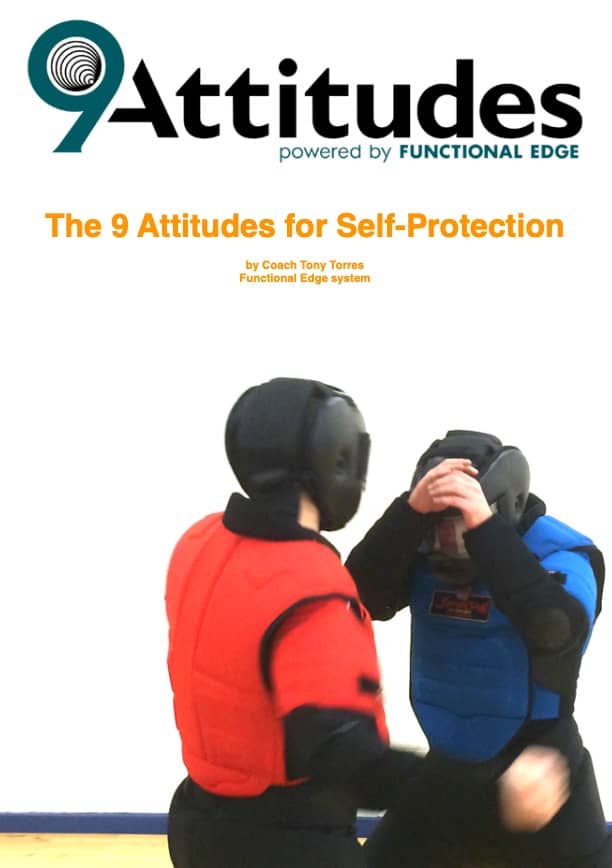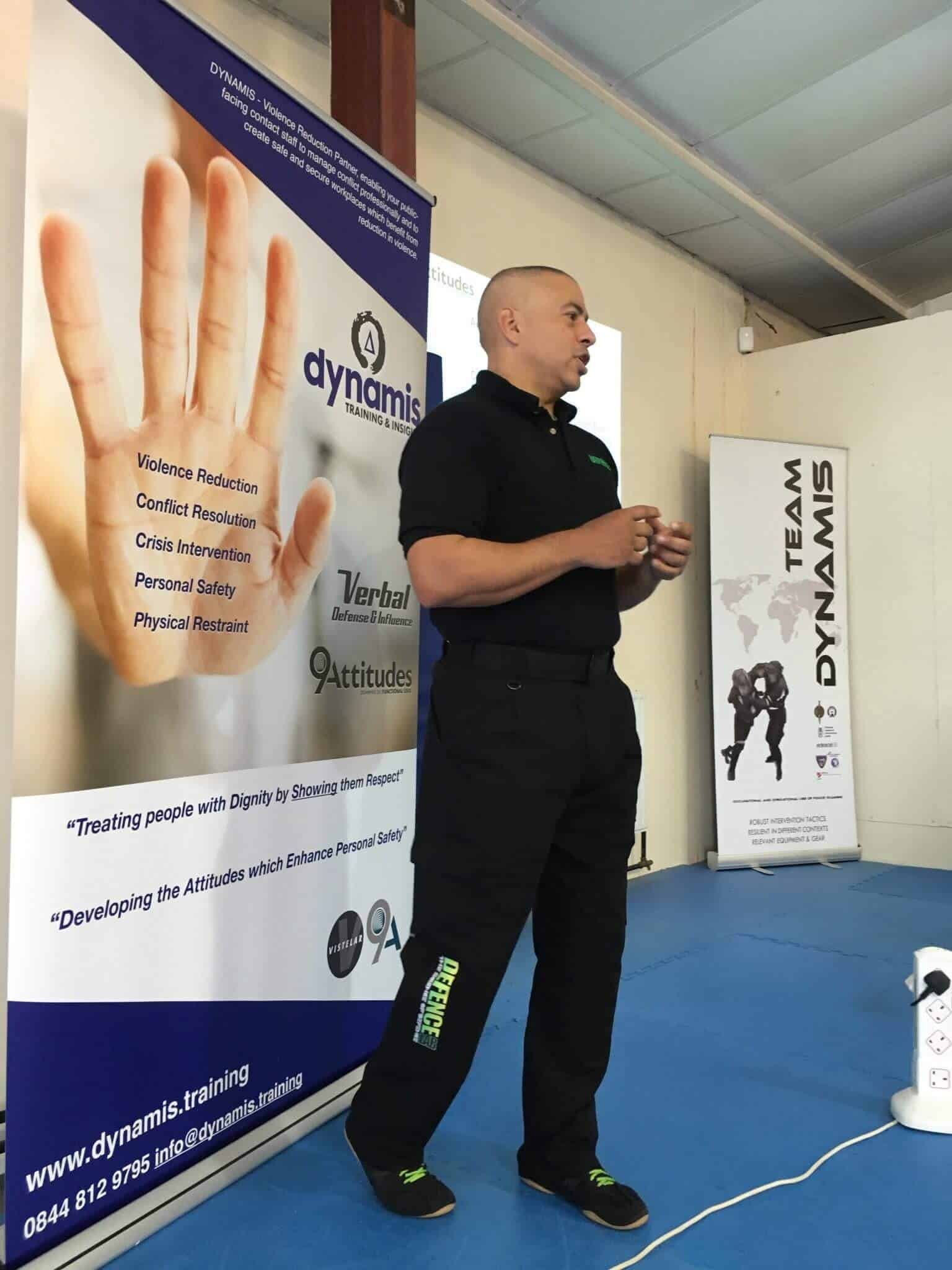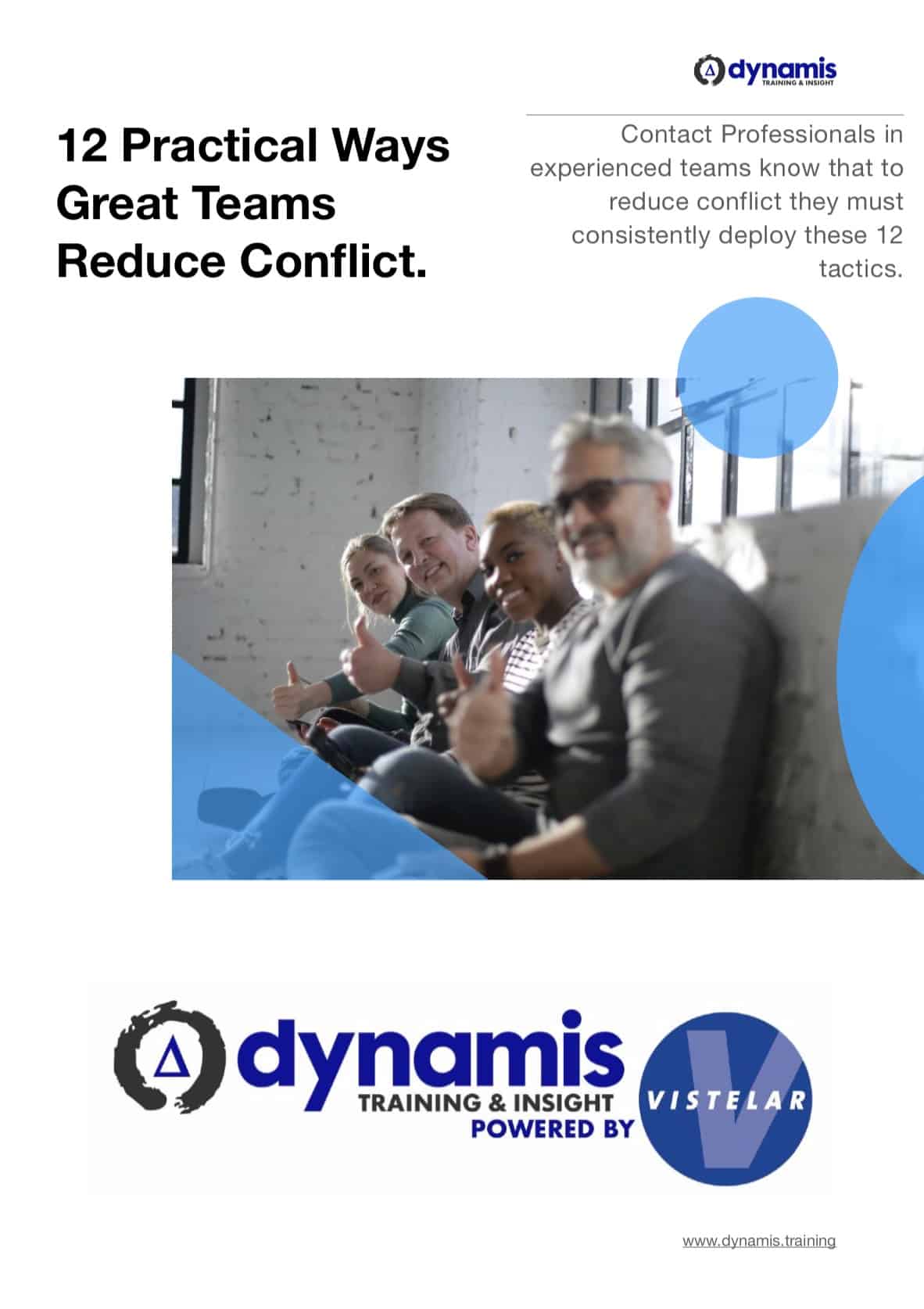In large-scale organisations, determining who the right people are to send on conflict resolution, personal safety or physical interventions training programmes is critical. In this article, Dynamis offers insight into why this is the case, as well as posing some questions that will help you partner with training providers to develop an efficient, engaging and (read more)
Personal Safety Train-the-Trainer
Become a responsible trainer with functional real-world tactics!
- Modern, Pragmatic Approach
- Progressively Intense Practice
- Based on Instinctive Protection
- Easy to Learn and Teach

Book a free Training Needs call now,
to join our community of progressive trainers.
Our clients
Hospitals and Healthcare

Public-Facing Organisations

Local Government & Citizen Services


Enter your email address to access "The 9 Attitudes" game-plan for managing any confrontation while staying safe and reducing professional exposure.
You will also get access to a mini-course about the 9 Attitudes and Coach Torres' approach to Confrontation Management.
Trainer Development since 2010
Dynamis has been running this flagship personal safety instructor course since 2011, training trainers and advisors to deliver the most comprehensive and up-to-date methodology for self-defence, personal safety and physical interventions available today.
Our Functional Self-Protection, Personal Safety and Protective Physical Interventions Instructor Trainer Course offers a professional qualification to those who wish to teach a legally accurate, safe and functionally effective course in functional intervention tactics. The teaching system we will show you is behaviourally-based and incorporates modern motor learning and performance concepts.
Duration:
3 to 5 Days in-person training (2,5 days for self-protection and 2.5 days for control tactics) building on a package of online learning and workbook assignments pre-course.
Functional Tactics - 9 Attitudes Instructor Certification
To Successfully pass this course you will need to complete the following five learning outcomes. To assist you, you will be provided with and signposted to all of the resource material you require. These will include: Fact-sheets, e-books and online video resources.
The course covers:
1: The Law in Relation to Interventions and Personal Protection
2: Health & Safety Best Practice for Running Interventions and Personal Protection Courses
3: Stress Inoculation Training Theory and Design Framework
4: The Science of Skills Training
5: Functional Edge System which can be adapted to suit the needs of Breakaway Skills or Physical interventions Training in the NHS, Lone Worker Safety training in Housing or Social Work, Officer Safety Training for Enforcement Teams, as the Self-Defence/Breakaway component of a PMVA (Prevention and Management of Violence) course for Mental Health staff, or other requirements. Our Advanced Control Tactics component covers higher-risk and lower-risk contexts and is suitable for use in a wide variety of workplace demands.
Materials and Resources
The Functional Self-Defence Instructor Trainer Course will be taught using a blend of pre-course distance-learning material, followed by attendance at the course where further lectures and physical skills development will complete the training and ensure your competence.
9 Attitudes Trainer Course Learning Outcomes:
1. The Law in Relation to Self Defence and Personal Protection
UK common and statute law that relate to the use of physical force for the purpose of self-defence or physical intervention. The meaning of ‘Reasonable Force’ with reference to statute and common law.
2. Health & Safety Best Practice for running Self-Defence Training Courses
The various elements of Health and Safety statute and associated Health and Safety regulations that relate to the use of running physical skills training courses and instructing physical technique, including the ‘common-law duty of care’ and ‘Tort’ with regard to Negligence.
3. Stress Inoculation Training Framework and Training Design
Understand the effect of the primitive fight and flight response and associated fear response mechanisms on physical, emotional and behavioural state and understanding what physical changes take place when the primitive flight and fight response is triggered.
4. The Science of Skills Training
Definition of skill, the relationship between arousal, stress and performance and the relationship between heart rate and performance. References to: Stress and Performance, Decision Making and Anxiety – Arousal – Reaction Time. Learning vs Performance. Scenario Development.
5. Functional Edge System of Self-Protection for Breakaway and Officer Safety
Demonstrate physical skills techniques consistent with the rights of defence and self-defence consistent with Reasonable Force and Article 2 of the Human Rights Act 1998, and which will be designed to work in situations of high emotional distress consistent with an understanding of the Primitive Stress Response and the Science & Psychology of Personal Combat.
Modern methods and approaches
The physical skills portion of the Personal Safety Trainer course will include modern approaches to the short-term management of violent assaults, including topics such as:
- shortening Reaction Time by recognising pre-assault behaviour
- the primitive fight and flight response and associated fear response mechanisms
- the relationship between arousal, stress and performance
- How Reaction Time and Decision Making effect motor skill performance
- capitalising on the natural strengths of the body’s survival system
Continuing Professional Development and Networking
Every year our certified 9 Attitudes instructors are invited to return for training which expands their repertoire and expertise into new and different contexts (see here for the list of advanced certs). Each year the experienced self-defence trainers are exposed over 2 full days to an advanced-level methodology from the 9 Attitudes system.
Each course is designed to offer the trainer a comprehensive methodology for dealing with very specific domains of the self-protection or physical intervention space.
Advanced modules deal with a variety of key ideas related to instinctive protection and specific types of interaction, or domains of confrontation. Each of the courses build skills in surviving, reversing and then engaging with an assailant in carefully layered stages of development which progressively increase the trainee’s skills in sometimes very dangerous contexts.
Contrary to much training in this area, each course focusses on the fundamental skills needed to mitigate the damage that close-quarters assault can do – it is based on a defensive strategy. Then, by looking at the ‘mechanics of an assault’ and by breaking-down, phase by phase, the various stages involved, we can increase survivability by making it harder for the assailant to inflict injury.
Gerard O’Dea
Trainer and consultant to the security, health and social care sectors in the UK with multiple BTEC qualifications in use-of-force, Gerard has developed and delivered courses for a wide variety of professional groups whose roles require them to deal with dangerous client groups appropriately. He has spoken at national events on the science and psychology of interpersonal conflict in these contexts and designs and delivers training programmes in the UK and internationally which reflect these realities.
Gerard leads the Understanding Reasonable Force and trainer risk-management portions of the course, supported by online learning materials, ensuring compliance with UK statute, common and human rights law.
Tony Torres
Defensive tactics instructor during his 9 years of service in the Search and Rescue and Nuclear Weapons Security fields in the US Navy and during his 13 year career as a decorated Master Police Officer in the City of Virginia Beach.
Mr. Torres also worked for Blackwater USA first as an instructor for Force on Force CQB Training then as a Team Leader in Iraq providing dignitary protection for US Department of Of State personnel including Ambassador Bremmer. He is the former Chief Instructor for Tony Blauer’s combatives programmes.
Tony leads the physical skills and confrontation management portion of our Self Defence Instructor course by introducing candidates to his Functional Edge System. a behavioural self-protection method.
“Thoroughly enjoyed the course. It gave me numerous ideas and drills I can start to use with my students. Teaching standard was excellent and I’m very keen to attend future courses”
– Martial Arts Instructor, Edinburgh University
“Course provided me with knowledge, tools and skills I will take away and use. By the end I felt confident that I was going to be able to structure, design and give a class. The presentation to peers was actually very helpful in pulling it all together”
– Self-Defence Course Leader, HM Treasury
“A greatly presented course with a high standard throughout. Thoroughly enjoyed training with Gerard O’Dea and Tony Torres”.
– Martial Arts Instructor, London
“Found both Tony & Gerard to be very professional and highly competent. Behavioural Self-Protection concepts were new to me – enjoyed learning them and training them. Very impressed by these 3 days. Thanks”
– Martial Arts Instructor, Glasgow
“Tony and Gerard were very helpful. Would attend again!”
– Team Member, Community Safety Team
“The course was very well run, pitched at the right level for the candidates. I found the whole course interesting – the easy way in which the techniques move into one another was particularly interesting. The coaches were helpful and very professional.”
– Physical Intervention and Breakaway Instructor, NHS
“All parts fitted well together with the video/online presentations supporting the physical skills aspect. Both trainers were very knowledgeable, enthusiastic and related well to the delegates. Course is excellent in this format.”
– Martial Arts Instructor, Stirling
“The course was run very professionally and both instructors were able to answer all questions. The physical skills part was most interesting – thank you very much for spending the time to help us.”
– Prevention and Management of Violence and Aggression Lead, NHS
“The course was well structured and full of information and practical practice. It has been one of the most beneficial courses for self-defence for me”
– Senior Control & Restraint Instructor, Prison Service
“Thank you both very much! I found the course really stimulating and empowering!
– Conflict Management Trainer, Private Company
“I would like to thank Gerard and Tony on the excellent delivery of the most knowledgeable and interesting course I have attended”
– Team Member, Community Safety Team
“Fantastic course, engagingly delivered – many thanks!”
– Mental Health Nurse and Violence & Aggression Management Lead
Trainers are exposed over 2 full days to a methodology which is specifically designed and architected to enable the trainee to control adult-sized subjects who are exhibiting extreme levels of violence and aggression.
This “Control Tactics” methodology enhances and supplements the more commonly-taught restraint methods which are often based on previous-generation models of technique or which are designed predominantly for use with vulnerable people.
This course is recommended for previously-qualified restraint trainers. The course will include up-to-date discussion and dissection of current topics in regard to single-person restraint and the use of pain compliance holds, based on a thorough understanding of the control/restraint dichotomy.
“The initial control and restraint of violent individuals is usually a fluid and dynamic process…the period of control or, perhaps more accurately, the period that leads to the control of a violent individual is usually far less structured and significantly more frenetic and potentially dangerous than that of the restraint period… I believe the easiest way to help identify this transition is by observing the actions of both the officers and the individual. Once control is achieved their actions tend to become increasingly measured and orchestrated.”
– Insp. Sutcliffe, Chairman elect of ACPO SDAR Practitioner’s Group, Evidence to the Sean Rigg enquiry
SELF-PROTECTION FROM RESTRICTED POSITIONS
In some situations, an assailant may attach themselves to a part of your body by grabbing and securing it, thereby restricting the free movement of that part of your body to protect yourself or indeed restricting your ability to simply escape. This course is designed to build on the principles of the core trainer programme to give you specific training progressions which build a capability to break free of restricted positions when they possibly occur. Various grabs and holds, or restrictive situations such as being held against or on an object, or when one’s limbs are trapped, are covered with simple tactics which can be combined in a series of efforts with the maximum chance of success in gaining freedom. This course is extremely useful addition to the core material for trainers who teach ‘Breakaway and Disengagement Skills’ for NHS or other health and social care environments.
How to Survive when an Edged Weapon is introduced into a Confrontation...
This advanced module deals with a variety of key ideas related to instinctive protection and knife/edged-weapon defence. The course builds skills in surviving, reversing and then engaging with a knife threat in carefully layered stages of development which progressively increase the trainee’s skills in this very dangerous context. Contrary to much training in this area, the course focusses on the fundamental skills needed to mitigate the damage that a knife or edged weapon can do. Then, by looking at the ‘mechanics of a knife assault’ and by breaking-down, phase by phase, the various stages involved, we can increase survivability by making it harder for the weapon to inflict its potential maximum damage.
Knocked to the Ground - Survive, Reverse, Engage
This course is designed to help a trainer to explore the difficulties and challenges encountered when a person is taken off their natural bipedal state and knocked to the floor or onto an object where they do not have both feet under them in a standing attitude. Progressions of drills help the trainer to address Kneeling, Seated and Reclining positions and how to most quickly and effectively regain a standing posture to reverse and engage the assailant and escape or otherwise resolve a situation. Assailant behaviours, when the target has been knocked down, are explored in great detail so the entire course delivers a comprehensive set of skills for Surviving, Reversing and Engaging in order to resolve this disadvantaged position.
When there's more than one opponent...
This course is designed to offer the trainer a comprehensive methodology for dealing with scenarios where there are more than one assailant to deal with. The presence of additional assailants creates both difficulties and opportunities for the target and in a series of progressively layered drills and exercises, this methodology offers the trainer a system to increase awareness of opportunities while reducing the risks and threats from multiple assailants. It builds from the Core Trainer methodology and adds new tools and tactics which are particularly useful for managing the chaotic mobile geometry of the ‘mass assault’ where awareness, evasion and re-direction during the collision of bodies becomes a valuable skillset.
A game-plan for professional control tactics.
The 9 Attitudes system gives you as the trainer a suite of training drills which progressively allow your learners to become functional and comfortable with the pressure, intensity, stress and chaos of dealing with real violence. As such it is possibly the most responsible and relevant Personal Safety and Control Tactics course available today.
Relaxed Attitude
Activated when there is nothing to worry about, when in a place or among people who make you feel safe and secure. An important anchor for all that is good and worth protecting in life.
Reversal Attitude
Activated at the moment when, fuelled by emotion, we physically, psychologically and emotionally regain balance and transition into productive movement to stop or slow the assailant.
Alert Attitude
Activated when our innate body-mind system detects some anomaly in our environment which draws our attention and demands that we examine it closely to review if we are safe.
Preventive Attitude
Activated when we identify that an anomaly in our environment is a risk to our safety and we actively need to do something to reduce the threat of it becoming harmful to us.
Survival Attitude
Activated when our instinctive protective mechanisms have fired under a sudden assault and and we cognitively seek to leverage those reflexes to survive the inital collision.
Engage Attitude
Activated when we press an opportunity created by survival and reversal and exploit it by causing dysfunction in the assailant, in order to meet our protection goal.
Escape Attitude
Activated when our protection goal is to move towards safety and away from the assailant immediately as the opportunity presents itself.
Control Attitude
Activated when we cannot simply move towards safety and away from the assailant, usually in complex situations regarding some duty of care to them or others.
Grab a coffee and speak to our training advisor.
With over 15 years of experience working with clients, we are confident that we can gain an understanding of your issues, resources, timeframes and budget quickly and soon propose a training plan which fits your needs.
How to...
Join the 9Attitudes Community as a Trainer
Our Partners and Accreditation

Regional representative for 9 Attitudes behavioural tactics
Dynamis represents the 9 Attitudes system, a fully behavioural approach to self-protection and physical control which is based on the observable realities of physical confrontation.
Gerard O'Dea // Director of Training at Dynamis
Hi and thanks for visiting our webpage today.
In over 15 years of working with frontline staff who face difficult, distressed and dangerous behaviour, I have seen time and again how prepared staff can perform well and respond to challenging circumstances.
From teachers to nurses, teaching and care assistants to security officers in our hospitals and social workers in the community, if you deal with people every day, managing conflict becomes a necessity.
I became involved in this work because I saw the power of training and preparation in helping people to stay safe at work and to be more successful in working with their colleagues to create better outcomes.
I and my team of professional trainers now teach in over 200 training engagements every year around the UK and internationally for a wide variety of public-facing organisations just like yours.
We have sought out the best conflict management training content and the best learning methods in the world and bring them together for you and your team.
Gerard O'Dea
Join Over 3,000 Happy Customers

Very well run, pitched at the right level
“The course was very well run, pitched at the right level for the candidates. I found the whole course interesting – the easy way in which the techniques move into one another was particularly interesting. The coaches were helpful and very professional.”
NHS Violence and Aggression Advisor

Very knowledgeable, enthusiastic
"All parts fitted well together with the video/online presentations supporting the physical skills aspect. Both trainers were very knowledgeable, enthusiastic and related well to the delegates. Course is excellent in this format."
Risk Manager / Training lead - Scottish prison Service college
What our customers are saying:

Very impressed...
"Found both Tony & Gerard to be very professional and highly competent. Behavioural Self-Protection concepts were new to me – enjoyed learning them and training them. Very impressed by these 3 days. Thanks"
Martial Arts / Self Defence Coach, East Sussex
A group of NHS Highland trainers have been applying Dynamis’ scenario-driven approach to their PMVA training since 2022 and have experienced some startling results, with one cohort reporting a 72% uplift in confidence about safely breaking away from violent contact. The NHS Highland team reported their experiences at an update to the GSA membership’s annual (read more)
© 2020, Team Dynamis Ltd
Registered Office:
Summit House
Mitchell St
Edinburgh EH6 7BD
0844 812 9795

